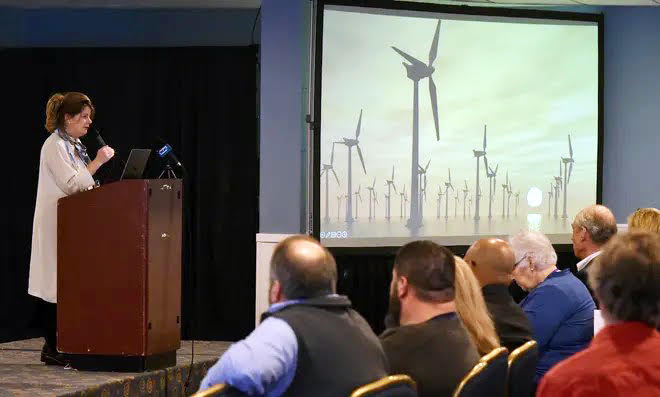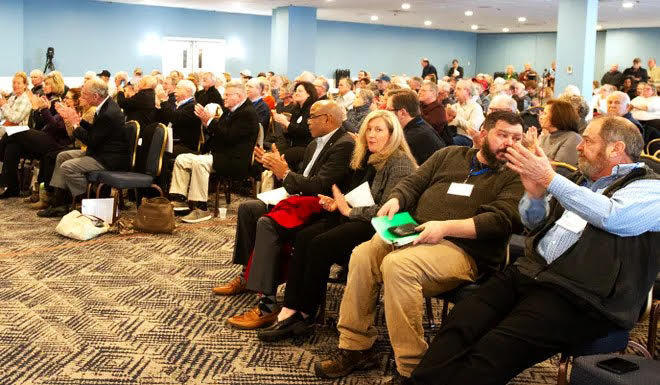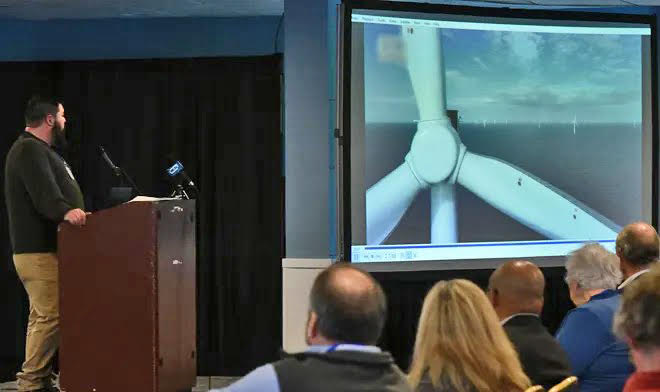On Saturday, January 27, 2024, FHMNA President Dave Buzanoski and Treasurer Greg Mazmanian attended the “Close to the Wind” Summit in Hyannis which was arranged and hosted by the Save Greater Dowses Beach (SGDB) group from Osterville. In 2023, FHMNA joined this group to be part of a coalition opposing wind developers bringing their industrial sized electric cables through our respective beaches and neighborhoods. Dave was invited to be a guest speaker and presented FHMNA’s opposition to the cables.
The Summit was a well organized, well presented and informative event attended by more than 300 individuals. The Cape Cod Times ran an e-version over the weekend: “Raising their voices: Offshore wind opponents…” and a similar print version in their Monday edition. The e-article is printed in full below. Unfortunately, the article did not include the last two presenters presumably due to a filing time deadline, so Dave, being the penultimate speaker, did not make it into the article.
A zoom recording of the meeting is now available on YouTube entitled “The Close to the Wind Summit 1/27/24”. (If it opens in the middle or end of the meeting, just scroll back to the beginning). Dave’s presentation appears at the 2 hour 54 minute mark on the video. The last speaker, also not included in the Times article, was Joe Bourne, a member of the Protest Sandbridge Beach Coalition group concerned with the Avangrid Kitty Hawk Offshore Wind plan in Virginia Beach. His presentation begins at the 3 hour 34 minute mark on the video.
The video is long, nearly 4 hours, but well worth watching. We feel it is important for our members (and the general public) to view this recording to better understand our opposition as well the tremendous impact on our environment including the New England fishing industry and fish stock on which we rely for a large portion of our diet.
The first part of the program focuses on the offshore impact of the proposed project. There are some very enlightening, eye-opening presentations including one by the “Green Ocean” group, another by “New England Fisheries Stewardship”, and others as well. The second part of the program focuses on the shoreside impact during which Dave spoke about the impact on Falmouth and FHMNA’s opposition to same.
While at the Summit, Dave had the opportunity to meet with Rep. Steven Xiarhos and Rep. Kip Diggs, both of whom claimed to have been unaware that Falmouth was facing issues similar to Greater Dowses Beach in Barnstable.
Falmouth Select Board members Doug Brown and Robert Mascali, Falmouth Finance Committee member Robert Dugan, and Falmouth Water Quality Management Committee Chairman Steve Rafferty attended.
The Cape Cod Times article is actually easier to read through Yahoo which not only contains the full article, but links to many underlined words/phrases such as “Park City Wind” and “Commonwealth Wind” which are not underlined below.
Lastly, a Facebook page has been created dedicated to Saturday’s Summit.
Raising their voices: Offshore wind opponents share environmental, health worries
By Anne Brennan & Heather McCarron
Cape Cod Times
Jan 28, 2024
HYANNIS — Since the offshore wind industry in Massachusetts went into high gear, a group of Cape residents say their concerns about potential harm to the environment and public health have been dismissed and ridiculed.
So, they held a summit.
On Saturday, more than 300 people crowded into a meeting room at the Hyport Conference Center in Hyannis to hear speakers — from Cape Cod, Maine, Rhode Island and Virginia — who addressed many of the residents’ concerns.
One theme among those who spoke is what they contend is a lack of information about both the potential benefits and drawbacks of utility-scale offshore wind facilities.
Avangrid and Copenhagen Infrastructure Partners‘ Vineyard Wind, a 62-turbine facility in waters south of Martha’s Vineyard, is under construction and sent its first power to the gird earlier this month. The company has proposed two other wind facilities, Park City Wind and Commonwealth Wind, also south of Martha’s Vineyard.

Lisa Quattrocki Knight, co-founder and president of Green Oceans, said the global economy was paralyzed during the pandemic, but the Food and Drug Administration still required the vaccine companies to do placebo-controlled studies to prove the vaccines helped prevent COVID. The companies also had to identify all the side effects.
She called for the same kind of study on the effects of offshore wind farms.
“We need to know the benefits as well as the harms,” she said. “Why are we giving these (offshore wind) companies such as a pass? Why is the government just letting this happen? And I would argue the COVID pandemic was just as much of a crisis as this climate crisis.”
Concerns over offshore wind off Cape Cod
-
Cables under environmentally sensitive areas
While Quattrocki Knight and other speakers implied offshore wind development should be stopped because of the damage to the ocean, marine life and radar interference, others complained about plans to land cables carrying electricity on Dowses and Craigville beaches and running them under town roads and sensitive environmental areas.
They point to Canal Generating Plant and Brayton Point power plants as better alternatives for transmission cable landings because the plants are connected to the electric grid. This would avoid sending cables under environmentally sensitive areas and would protect the Cape’s sole-source aquifer.

2. Potential oil, dielectric fluid leak
Cliff Carroll, who founded windstop.org after the now-defunct Cape Wind project was proposed, said a potential oil leak from substations or power transmission cable encasements poses a threat to the aquifer. The region gets its drinking water from the aquifer, which is recharged by rain and melting snow.
He focused on the substation planned for 8 Shootflying Hill Road, related to its size and its location, which is upgradient from Wequaquet Lake and a wellhead protection zone.
Storing 125,000 gallons of dielectric fluid — a substance used as an insulator in high-voltage systems — at the substation site on top of the aquifer seems unwise, he said. That’s in addition to 45,000 pounds of cooling gas referred to as SF6, he said, which the federal Environmental Protection Agency rates as the most potent of all greenhouse gases.
3. Finances of wind companies
Avangrid withdrew from its power purchase agreements for the Park City Wind (Craigville Beach) and the Commonwealth Wind (Dowses Beach) projects in the fall to secure new agreements under better terms in the next wind procurement round. Local citizen groups contend offshore wind companies should be unable to continue with permitting processes while their finances are in question.
Avangrid leaders have said they hope to take advantage of a collaboration between Massachusetts, Rhode Island and Connecticut that aims to coordinate the selection of offshore wind projects. The Healey-Driscoll administration announced the partnership in the fall, which aims to expand regional benefits and bring in viable, at-scale projects that can take advantage of cost reductions, boost regional economic development, create jobs and promote environmental justice and equity.
According to Avangrid, its projects have been troubled by supply chain problems, expenses tied to the war in Ukraine, inflation and rising interest rates that have all resulted in higher overall costs that were not offset by the previous agreements completed before the economic situation declined.
4. Health effects of electromagnetic fields, or EMFs
Several speakers worry about electromagnetic fields, or EMFs, produced by the power cables and the potential harm to the health of people who spend time on the beaches and live and work along the cable route that would carry power to the Shootflying Hill Road substation. Avangrid insists the cables would be buried deep enough to make any EMFs negligible.
Dr. Gary Peters, a retired orthopedic surgeon, said electrical fields are shielded from the concrete cable casing, but magnetic waves are not. Most studies on the health effects of magnetic waves from electrical wires have been done on overhead wires 40 to 50 above ground, not a cable five feet underground.
‘No dark money’: Groups questioning wind power say they are not funded by fossil fuel interests
Adam Mirick of Save Greater Dowses Beach and Bob Schulte of Barnstable Speaks, in their comments to the receptive crowd, firmly denied allegations made in an op-ed by Nick Krakoff of the Conservation Law Foundation that their groups are funded by fossil fuel interests, saying, they get their money from members of their organizations and, in the case of Barnstable Speaks, a local business.
“We are neutral on offshore wind,” Mirick said. “There is no dark money behind us.”
Barnstable town officials, some town councilors and Cape state representatives attended the summit.
“These are the oceans we work on and enjoy,” Susanne Conley, steering committee chair of Save Greater Dowses Beach, said. “We have a right and a duty to ask questions in order to protect it all.

Anne Brennan is a Times staff writer and executive editor. Contact her at abrennan@capecodonline.com or follow her on X: @AnneBrennancct
Heather McCarron writes about climate change, environment, energy, science and the natural world, in addition to news and features in Barnstable and Brewster. Reach her at hmccarron@capecodonline.com, or follow her on X @HMcCarron_CCT.
The Cape Cod Times mobile app gets you to the heart of the matter — fast. Whether breaking news, sports, entertainment or weather get succinct, personalized coverage along with award-winning videos, captivating photography, and interactive user features. Download the app.
